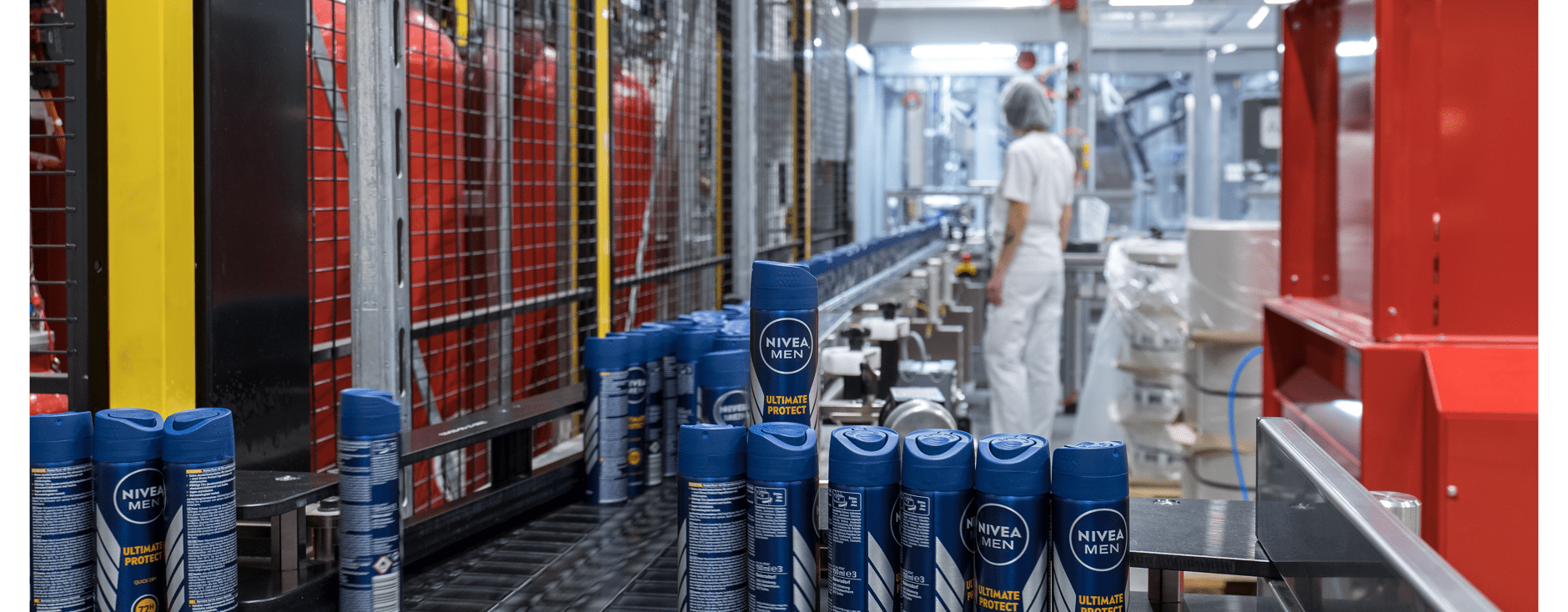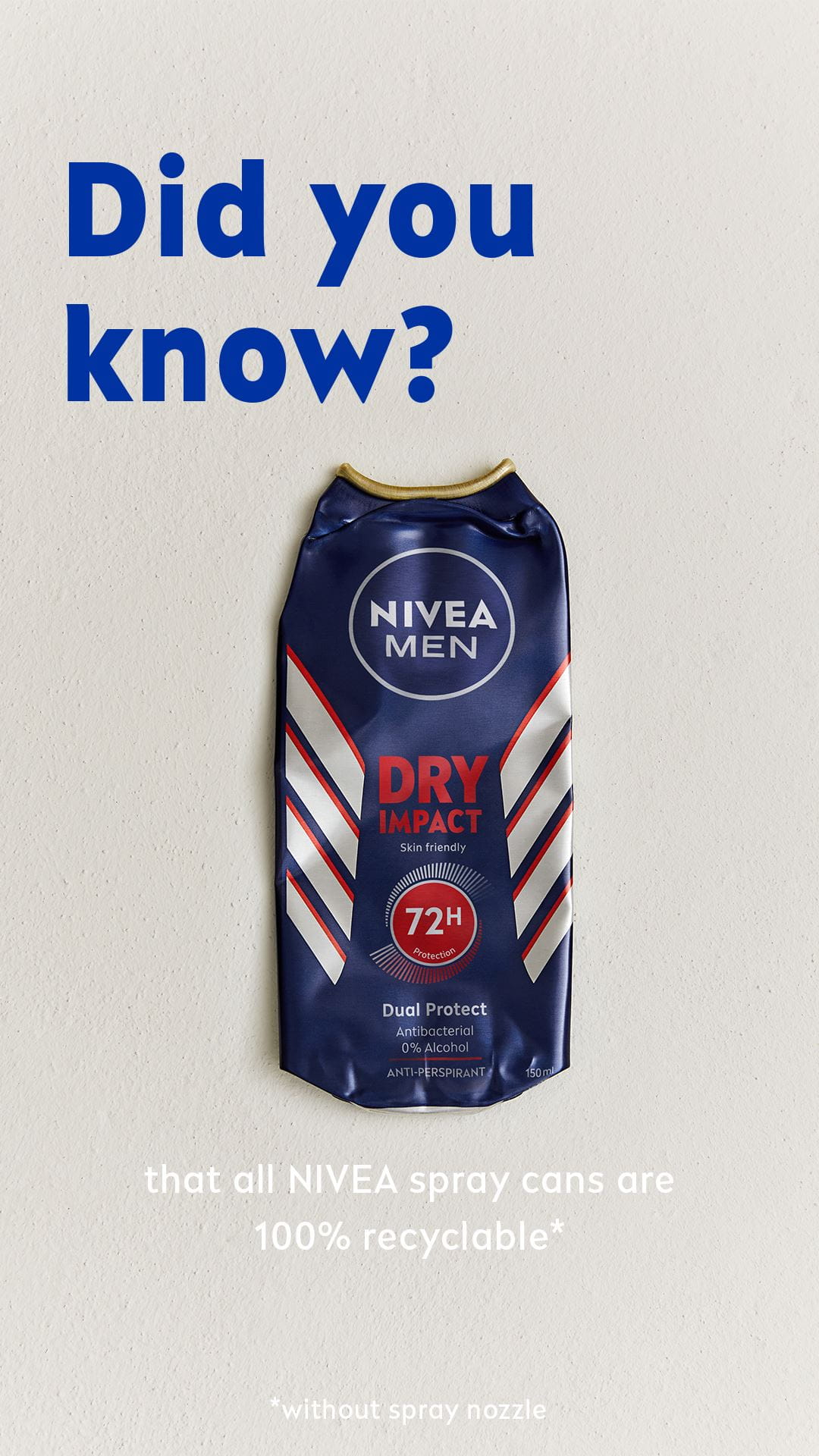
Recycled Aluminium Packaging
Recycled Aluminium: NIVEA’s Approach Towards a Circular Economy
Your skin always comes first, and NIVEA wants to make sure that you continue to feel refreshed and rejuvenated in a safe and sustainable way. NIVEA’s aim is that every product is created with sustainability in mind, including its packaging. Aluminium packaging, particularly from recycled aluminium, has become more noticeable over the years as a sustainable choice of packaging material, due to its extensive lifespan and the fact that it can be infinitely recycled. NIVEA converts more and more to the use of recycled aluminium (r-alu) in product packaging in hopes to make a change towards a greener world. Read more on NIVEAs use of recycled aluminium, including the reasons why r-alu contributes to a circular economy.
Aluminium in the world of skincare
Aluminium regularly features in product packaging that you use in your everyday life, including cans, tins and foils. Its properties mean that it can be used as a barrier to keep things fresh. Not only can aluminium packaging resist both hot and cold temperatures, but it is known to be a long-lasting and infinitely recyclable metal.
NIVEA recognises that aluminium still plays a vital role in product packaging. This is evident in NIVEA products such as shaving gels, deodorants or our NIVEA Creme tin, where aluminium is used as a safe packaging material.
NIVEA recognises that aluminium still plays a vital role in product packaging. This is evident in NIVEA products such as shaving gels, deodorants or our NIVEA Creme tin, where aluminium is used as a safe packaging material.
Is aluminium sustainable?
Aluminium is generally 100% recyclable and is capable of being recycled again and again without losing its original properties. Approximately 75% of the 1.5 billion tonnes of aluminium ever produced are still in use today¹. Therefore, aluminium can play a vital role in helping the world reach full circularity. A circular economy is based on three underlying principles:
1. The elimination of waste and pollution
2. Utilising high value circulating products and materials
3. Making the world a greener place
1. The elimination of waste and pollution
2. Utilising high value circulating products and materials
3. Making the world a greener place
Why aluminium should be recycled
The demand for aluminium continues to increase globally. However, aluminium is CO2 intensive in its initial production, impacting greenhouse gas emissions by accounting for 1.1 billion tonnes of CO2 emissions per year³. Given this, recycling aluminium can provide opportunities to reduce emissions in both the production and transportation of aluminium.
Because aluminium is a valuable material, it should be continuously recycled for longevity. Aluminium can be easily recycled due to the strong, sturdy, lightweight, and corrosion-resistant properties that make it a suitable material in many industries. Unlike plastic, recycled aluminium retains its quality and can continuously play pivotal roles in many manufacturing industries.
Increasing the consumption of recycled aluminium, rather than creating more aluminium, is the way forward. It is important to ensure that all end-of-life aluminium products are collected and recycled efficiently, as giving aluminium an endless life cycle will allow for the entering of a circular economy. It has been determined that by increasing the use of recycled aluminium, the world could avoid up to 39 million tonnes of CO2 emissions per year by 2050⁴.
Because aluminium is a valuable material, it should be continuously recycled for longevity. Aluminium can be easily recycled due to the strong, sturdy, lightweight, and corrosion-resistant properties that make it a suitable material in many industries. Unlike plastic, recycled aluminium retains its quality and can continuously play pivotal roles in many manufacturing industries.
Increasing the consumption of recycled aluminium, rather than creating more aluminium, is the way forward. It is important to ensure that all end-of-life aluminium products are collected and recycled efficiently, as giving aluminium an endless life cycle will allow for the entering of a circular economy. It has been determined that by increasing the use of recycled aluminium, the world could avoid up to 39 million tonnes of CO2 emissions per year by 2050⁴.
Making the world a greener place
Product carbon footprints are burdens which are addressed by NIVEA. NIVEA advocates the recycling of aluminium and the use of recycled aluminium, in hopes of making the world a greener place. NIVEA aims to utilise recycled aluminium for skincare product packaging to reduce carbon footprint and boost a circular economy. NIVEA’s commitment to reduce waste is at the core of our sustainability goals, and NIVEA fully believes that by utilising recycled aluminium as much as possible, we strongly contribute to our goal towards a circular economy.
Frequently Asked Questions
ONE SKIN. ONE PLANET. ONE CARE.
We want to be 100 percent transparent and answer all your questions about sustainability at NIVEA. If you could not find all the answers you were looking for on this website, or are looking for more detailed information, please visit the sustainability website of NIVEA’s parent company, Beiersdorf.
¹UK Department for Business, Energy and Industrial Strategy, Greenhouse gas reporting: conversion factors 2019, base: medium car (petrol)
²Aluminium for future generations: https://recycling.world-aluminium.org/review/sustainability/
³World Economic Forum, 2020, Why addressing the aluminium industry’s carbon footprint is key to climate change: https://www.weforum.org/agenda/2020/11/the-aluminium-industry-s-carbon-footprint-is-higher-than-most-consumers-expect-heres-what-we-must-do-next/
⁴Circular Aluminium Plan, 2022, A STRATEGY FOR ACHIEVING ALUMINIUM’S FULL POTENTIAL FOR CIRCULAR ECONOMY BY 2030
²Aluminium for future generations: https://recycling.world-aluminium.org/review/sustainability/
³World Economic Forum, 2020, Why addressing the aluminium industry’s carbon footprint is key to climate change: https://www.weforum.org/agenda/2020/11/the-aluminium-industry-s-carbon-footprint-is-higher-than-most-consumers-expect-heres-what-we-must-do-next/
⁴Circular Aluminium Plan, 2022, A STRATEGY FOR ACHIEVING ALUMINIUM’S FULL POTENTIAL FOR CIRCULAR ECONOMY BY 2030
.jpg)
.jpg)
